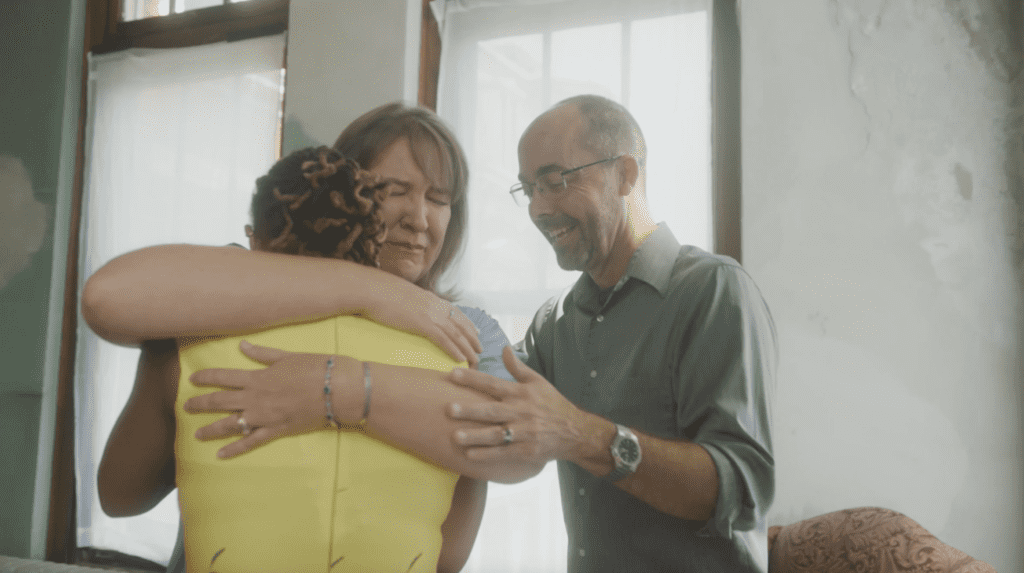It was 1995 when 20-year-old Bonnie picked up a child sponsorship packet from a table at church. She looked down at the photo of a girl in Uganda who was waiting for a sponsor.
“For some reason I was drawn to her,” Bonnie remembers.
After reading that Norah’s birthday was almost exactly 10 years after her own and that the two of them shared a love of singing, Bonnie decided right then to sponsor Norah.
“The Spirit moved and said that I was able to actually do this even though at that time I didn’t have a steady job or anything,” Bonnie says. “But I think it was just something I felt called to do.”
It would be 26 years before she realized the magnitude of her decision to become part of Norah’s amazing story. But Bonnie began building their relationship right away through letter writing.
READ: Part 1 of Norah’s story
“The Front-Row Seat”

Four years later, Bonnie met and married her husband, Jeff. Vaguely familiar with Compassion, Jeff began to learn more about child sponsorship. While Bonnie’s motivation to sponsor Norah was largely emotional, Jeff joined the cause for pragmatic reasons.
“It was just a matter of going, ‘Holy cow, check out this need. If I can help do something about that, why wouldn’t I?’ It just made sense,” Jeff remembers.
Together he and Bonnie exchanged letters with Norah, even though — like many other sponsors — they felt they didn’t write often enough.
Still, letter by letter, the Colorado couple got a glimpse into Norah’s life — what she was learning at her Compassion center and how her family was doing.
“I felt like I got the front-row seat of watching her grow,” Bonnie says.
They learned that Norah’s father had died in the 1994 genocide across the border in Rwanda. But Norah didn’t share many details about it, and Bonnie didn’t know if or how she should bring it up in letters. So she and Jeff focused on what they had in common with Norah: their faith. In one letter, Norah shared that she had memorized her favorite Bible verse:
“For I know the plans I have for you,” declares the Lord, “plans to prosper you and not to harm you, plans to give you hope and a future.”
Jeremiah 29:11, NIV
“And I remember that letter so specifically,” Bonnie says, “because that was my first memorized verse as well. And of course she wouldn’t have known that.”
Over time Norah’s letters revealed how she was maturing in communication skills and faith. “As she was growing and starting to share things, the excitement came through in the letters,” Bonnie says. “And it was just fun because at that same time, I was in a big growth time in my life — to just have more and more understanding myself about God and what he was doing.”
The day they learned that Norah was completing the Child Sponsorship Program and preparing for university, Bonnie and Jeff believed that their chapter in her story was ending. Crying bittersweet tears, Bonnie trusted that God would continue to prosper Norah. But neither she nor Jeff could imagine just what that would look like.
26 Years Later …
This summer, Bonnie and Jeff received an update from Compassion while they were on a trip celebrating their anniversary. They learned that Norah now lives in the U.S. with her husband and their children.

Norah, now a social worker, recently began sharing her remarkable story more widely as a speaker at Compassion events. She has also spoken on several podcasts, including the “Real Mom Podcast.” In a recent episode, host Jamie Finn interviewed Norah about her childhood growing up in poverty, losing her father in the genocide and how she got to where she is today. During the interview, Norah effused about her sponsors:
“My sponsors were the most amazing people in my life — the most precious asset that God ever gave me in my life. Because every word they said to me felt like an asset to me. My sponsors wrote to me letters, and if anybody out there doesn’t know how important a letter is to a child, this is the time for you to understand this: I was so hopeless and my sponsors wrote to me letters and they said to me, ‘Norah. We love you.” … And they always said, ‘We believe in you.’”
Norah tells the podcast host that because Jeff and Bonnie believed in her, she never wanted to disappoint them.
“It’s very important to have someone who speaks positivity into your life. Someone who prays for you. My sponsors always told me they were praying for me. Those letters were the most precious things in my life.”
Connecting the Dots
On their anniversary trip, Bonnie and Jeff tuned in to hear Norah’s podcast interview. For the first time they heard the voice of the person they wrote to, prayed for and supported for so many years. And she was talking about THEM. She compared Jeff and Bonnie to her “other parents.” Jeff and Bonnie were in awe.
“I was sitting there hearing about the impact of the letters, and I thought, ‘I’m such a horrible letter writer. How did she get all of that out of it?’” says Bonnie, laughing. “So then again you see what God was doing behind the scenes that really had nothing to do with you. He takes it anyway and makes it his.”
Jeff marveled at how God took what seemed so minor — a relatively small monthly cost of sponsorship and a few letters with basic messages shared — and changed lives in a major way.
“God’s able to magnify the impact of some dollars. So he can do that with anything,” Jeff says. “He can do that with words that are translated across a page, going across international seas. And it means something. It connected. That’s, I think, supernatural intervention at some point.”
Bonnie points out that although they were playing the role of sponsors in Norah’s life, Norah blessed them just as much as, if not more than, they blessed her. “I think one of the most precious things to us is: We never had children, by God’s design. And it was like, ‘OK, well that wasn’t the plan,’” she says. “So you can imagine for us, hearing her in a podcast saying that she calls us her other parents? Talk about blowing us out of the water to just see another little gift God has given us, that we have been completely blessed.”
“And again it just reminds me how God is the hero of this. He’s the author of this. Really we just played this much part in it,” Bonnie says, using her fingers to show how little she sees the part she and Jeff played in Norah’s life as her sponsors. “And it’s incredible to see what that little part does.”
The Story Isn’t Over …
Norah said one more thing in the “Real Mom Podcast” that stood out to Jeff and Bonnie — and to Compassion staff in the U.S. The host asks Norah if there’s anything she wants to say to her sponsors, and she replies:
“Oh my goodness. Let me say this now, I hope they hear this: I’m looking for them! I’m looking for Jeff and Bonnie … who sponsored me. Those people changed my life. And I am what I am today because of their sacrifice.”
Here’s a sneak peek at the next exciting chapter in this story … read it now!

Inspired to write to the child you sponsor now? Your words can help change a life!







26 Comments |Add a comment
What an amazing story! My daughter and I sponsor a little girl in Ethiopia, and her and I share the same birthday. I am honored to do this for the Lord, and my prayer and dream would be to have 1/2 of the impact that this has had on our little girls life. I am so blessed, thank you God.
Hi John and Dorothy! Thank you so much for blessing the child that you sponsor. It is so fun that you share a birthday with her! We are grateful for your partnership in releasing children from poverty in Jesus’ name!
I want to write a letter to my International Compassion child. I wrote a letter earlier today but seem to have misplaced it. I will write another one if I need to.
Hi Ann! Please rest assured that I can see the letter you have written to Heart yesterday. Your new letter to her is in translation, and you should be able to see this when you log into your My Account, go to “Write My Child”, and then look at your letters and conversation history. Please email us at [email protected] if you have any questions. We greatly appreciate the difference you are making in Heart’s life through your support and encouraging letters. God bless you!
I just finished sending a letter with photos to our young man in Thailand. We have sponsored him for nine years, just before he turned five. It is incredible to look at that first photo when he was four and to see him now at thirteen. There are times I have nothing new to say in a letter, especially as my husband and I are up in years. Sending pictures helps us to communicate what is going on with our family and pets.
I am grateful God gave us this young man all these years. We haven’t always sent as much money or letters as we should or would have liked to, but I pray we will have some positive impact on him for God. Thank you, Compassion organization.
Thank you so much for sharing this and for sponsoring your precious boy for over 8 years! 💙💌 I am confident your letters and photos mean the world to him. God is so good. 😊
We are honored to sponsor and write to our sponsored child, out of respect, I will not use her name, but God knows who she is, and we are so happy to be able to be a part of this child’s life!
Matthew and Janette, thank you very much for sharing and for pouring into your precious girl’s life! 💕💌
If nothing else inspires me to get better about my letter writing to my Compassion child, this story does it. Even though I have never met Erseline in person, I feel a connection to her and that is God working in my life and hers.
Claire, thank you so much for sponsoring Erseline. I am so encouraged and blessed to hear how God is growing your relationship with her! You have a wonderful ministry opportunity, and your child will love and appreciate your letters. There are many other wonderful and helpful letter writing blogs on blog.compassion.com as well, and I encourage you to subscribe so you can continue receiving encouraging stories and helpful tips! Please know that we are here for you.
Wow such a blessing! Cannot wait to hear more of this story. It had me in tears as well. We are so blessed in this country with our spoiled comfortable lives. I pray that more choose to make a difference in helping children in poverty and that one day i can meet the child that my family has been sponsoring.
Tonya, thank you to you and your family for sponsoring a child! We pray and hope with you that you are able to meet in person someday.
Sometimes in writing to my sponsored kids, I fret and labor over just how to say what I want to say about hope for the future, and the value and comfort of trusting God completely. And here none of that concern is necessary because God will take my meager words and translate them into just what my sponsored kids need to hear. Thanks for highlighting that through this amazing story.
I do so desperately want 2 help. My husband & I are barely making it on my social security but I feel pulled 2 share. There is always so much month left @ the end of the check but compared 2 wat they hav we are beyond rich. I would love 2 share my bday w/1 but maybe sharing the bday of the daughter we lost in 2013 would be better, or both? Putting it 2 prayer. I’m asking God 2 guide me but maybe some suggestion?
Hi Barbra. Thank you so much for wanting to bless one of these children. I’m sorry to hear that you lost your daughter in 2013. If you wanted to sponsor a child in her memory by finding one with her birthday, I think that would be a sweet connection for your family. With that said, you can also sponsor a child with your birthday, and that is a fun connection as well! Ultimately, I agree with you praying for God to guide you in making this decision. He always provides the best wisdom! If you have any questions for us, please send us an email at [email protected]. Thank you!
Amazing journey to be part of compassion international through my local church. I was graced by one family and am grateful I made it this far.
Tears in my eyes…. it’s already a beautiful story!
I look forward to reading the “rest of the story”. Soon, very soon!
I’m so excited for the next part as well, Lois! ??
This brought tears to my eyes! Thank you for sharing! Can’t wait for the next post.
Same, Lisa! ?? We are so glad that Jeff, Bonnie, and Norah’s story was a blessing to you!
What a wonderful story!! I was able to meet my sponsored girl three years ago and it changed my letter writing. This story is motivation to keep writing and developing that relationship. Thank you!
Kym, that is amazing! I love that you have been able to visit your precious kiddo. ?? Thank you for continuing to pour love and support into her life!
Wow! What a story! Indeed a story of God’s doing.
Praise be to God almighty who used the few words of Bonnie and Jeff to change and build Norah’s life.
Such a gift of love, generosity and concern is a gospel fruit. Praise be to Christ our savior in whom we are all enabled to help this way. May God continue working through other sponsors of compassion!
Peter, thank you so much for your continued prayers and for your encouraging words! ? We are grateful that their story made such a positive impact on you. ?
I can’t wait till the December post! Thank you for sharing this inspiring story.
We are excited for it too, Ann, and we are glad this one was inspiring! ?? Thank you so much for your support!